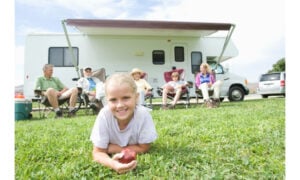For most families, vacations and excursions are limited to certain times of the year. Summer is generally the most popular season for travel since kids are home from school. The same can be said about winter breaks and spring breaks, when traditional schools usually close for about a week. That’s too bad. Because homeschoolers can travel at any time of the year. Why? Because they can bring school with them! Homeschooling and travel can go hand in hand. There’s actually a name for it–roadschooling! And with this great world of ours just waiting to be explored, why not take education on the road?
What is roadschooling?
The definition of roadschooling is about what you’d expect it to be–taking education on the road! Roadschooling is growing more and more each year, and it offers kids the most hands-on learning experiences imaginable. While some might equate roadschooling with students working on their laptops or workbooks in the backseat, that’s only part of it. Roadschooling is about actual road trips on a regular basis. And on these trips, students learn by seeing, touching, smelling, and hearing whatever their parents are teaching.
Roadschooling is all about learning history in a new way or immersing oneself in a new culture and different traditions and customs. It’s about experiencing important events up close and personal or seeing where exactly they occurred. And it’s about exploring new terrain or natural environments.
What are examples of roadschooling?
There is more than one way to roadschool your child. Some families take the occasional road trip and fill in the rest of the time with a homeschool education. Others travel the country in an RV or camper for weeks or even months at a time. Along the way, kids not only study, read, and learn during the drives to each destination, but they also experience lessons up close and personally.
Say, for example, you’re taking a road trip to the American Southwest. For a history lesson, you could visit the Alamo in San Antonio and learn about the Texas Revolution. You could also work some geography lessons into your trek by stopping at the majestic Grand Canyon in Arizona, the stunning mesas and white sands of New Mexico, the breathtaking Monument Valley along the Utah-Arizona border, the cactus-filled deserts at Saguaro, or the cascading waterfalls and mountains at Zion National Park in Utah. Want to work some engineering and math lessons in as well? Take a drive to Hoover Dam, a modern wonder of the world located on the Arizona/Nevada border.
And that’s just one road trip! The opportunities are practically endless in the United States. American Revolution field trips along the East Coast. Marine sciences in the Atlantic or Pacific Oceans or the Gulf of Mexico. Civil War battlegrounds in the South. The possibilities are practically limitless–though your budget may not agree. And that is something to take into consideration. Of course, through roadschooling, kids get to learn in a new way and see the world up close rather than through the print on a textbook page or on a screen. Just be sure to operate within your financial means.
What are the requirements for roadschooling in the United States?
Though the prospect of traveling the country without a care in the world is certainly appealing, there are some rules and regulations that roadschoolers must abide by.
If you plan to roadschool, you need to establish a home state and follow its laws for homeschooling. The reason for this is, roadschoolers are either on the road often or permanently; in fact, many roadschoolers don’t have a physical home–they travel the country in RVs and mobile homes. Because there generally needs to be a degree of regulation around homeschooling, it’s required that roadschooling families declare official residence in a particular state.
If you maintain residence in a state, all you need to do is comply with that state’s rules and regulations. If you are living and traveling in a recreational vehicle, you can choose which state will be your “home” and follow those laws accordingly. Which state you decide to make your domicile is entirely up to you, but here’s some helpful advice from the Homeschool Legal Defense Association:
“If you plan to live in another state for a period longer than a month during the time that public schools are in session, HSLDA generally recommends that you comply with the requirements for home education in that state. This general recommendation applies even if you and/or your spouse pays taxes, own property, and/or have employment in another state.”
Once you’ve decided on a domicile state, you can then shape your curriculum and assessments. Since roadschooling tends to be somewhat spontaneous and adventurous, formal classes aren’t usually part of the agenda. But grade- or skill level-appropriate curriculum is a good companion to your road trips and can help reinforce learning. How you track grades depends on the requirements of your state, so make sure you know the laws before hitting the road!
What are the benefits of roadschooling?
Roadschooling isn’t the easiest way to provide your child with a high-quality education. But it can be so rewarding that many families take that challenge head-on for some of the following reasons.
- New and amazing experiences. The experiences a child gets on the road simply can’t be duplicated in a classroom or even at home. Having the opportunity to travel and see historical sights or immerse yourself in another culture is invaluable and can’t be learned from a textbook or online program. And while learning on the road, questions and projects arise organically from the experience, which provides another opportunity to teach new lessons and important skills such as problem solving and critical thinking. Plus, what better way to get inspired when writing an essay or a poem than watching the sunset over the Grand Canyon?
- Experiencing diversity and increasing awareness of others. If you live in the Southwest and don’t travel often, how can you understand the people and lifestyles of those in the Pacific Northwest? Or if you live in the Northeast, what can you truly know about the Southern population if you don’t see it for yourself? Unfortunately, we live in very polarized times, where groups of people make overarching assumptions about other groups of people without knowing or understanding them. Roadschooling gives kids (and adults) a rare opportunity to visit other areas of our great country to learn about local groups, customs, and cultures. Experiencing this type of diversity is the first step toward breaking down barriers between geographically separated groups. And once that happens, people of all ages can start to embrace and celebrate each others’ differences rather than resist them.
- More efficient learning. When traveling from one destination to another, there are only so many ways to entertain yourself in the car or RV. This can be the perfect time for students to complete assignments and study. In fact, for elite athletes or performers who are frequently on the road for competitions, rehearsals, performances, and events, it may be the only time to get some quality work in. If you haven’t read our student spotlight on Devin and Drew Walz, Bridgeway Academy students who are highly competitive kart racers, check out the story here to see how they manage to balance their studies with travel and racing with the time they have available.
- Social learning. One of the many benefits of homeschooling while on the road is the ability to learn together as a family. Education doesn’t stop once you exit the doors of a museum or drive away from a historical landmark. In fact, it’s only just beginning! Once back on the road, that’s when families can start talking about what they saw, experienced, and learned. This is when different viewpoints and perspectives surface, which creates lively conversation and debate.
How to homeschool while traveling in the United States
There is no rulebook when it comes to roadschooling, aside from having to establish a home state and follow those rules. So, how should you roadschool? Pretty much any way you want to! But here are some suggestions:
- Decide what type of road trip you’re taking. If you want your trip to be short-term (less than a month or two) and purely enjoyable, set homeschooling aside. Yes, you read that correctly–don’t homeschool! Rather, focus on your family and take in the experience. Of course, continue to visit museums and cultural sites and sights, but resist the urge to make homeschooling a priority. You’ll have plenty of time to make up the work and time missed when you get home. If it’s a longer-term road trip, you’ll need to work in homeschooling. That’s why it’s smart to have a plan.
- Make a plan, then be ready to deviate from it. Most homeschoolers have at least a loose plan for their year. It’s fine to allow your child’s interests to lead, to use the history, culture, geography, and arts experiences in your area and on your trip to guide your homeschooling while you travel. But you should still make a rough plan of what you want to accomplish for the school year. Start by listing the subjects and goals for each child based on your home state requirements. Others may want a calendar with goals for what you wish to accomplish academically while you travel. Do what works best for you, but be sure to chart it out and have a rough idea of what you want to accomplish while gone.
- Start saving and researching as a family. This is the perfect opportunity to teach important life skills such as financial literacy, budgeting, scheduling and planning, and research. Not only are these invaluable skills for kids to learn at a young age, but they also get to participate in the fun of planning the family’s road trip!
- Pack your books, a tablet, and/or a laptop. Roadschooling means you’ll be doing school while traveling, which, as we mentioned, takes some planning on your part. Specifically, gather the curriculum and materials you’ll need to take with you. The good news is you can take an entire library with you on the laptop or tablet. Great curriculum options are found online these days, as well as virtual libraries, educational videos, audiobooks, and amazing interactive curriculum companions like Elephango! Artistic, musical, and even scientific studies can all be accomplished on a single device. Just be sure to pack paper and pencils for those kinesthetic learners who need to work it out on paper!
- Set a rough daily schedule for schooling and fun. Roadschooling is all about flexibility. But even vacations and road trips need an itinerary or schedule to accomplish goals and meet deadlines (tours, flights, etc.). Take that organization into your homeschooling routine. As an example, during your road trip, dedicate two days a week to school and spend the other five days making priceless memories. Or maybe you plan your mornings for fun and two hours each afternoon to accomplish school work. Perhaps you do an intense week of schooling followed by three weeks of travels. Consider your student’s capacity to get work done and focus, as well as your travel goals. Then create a schedule that makes sense for your unique family and experience.
Homeschooling and travel are a winning combination if you commit to getting the most out of it. Remember, learning doesn’t have to happen in a classroom–it can occur anywhere you are. Roadschooling can be a life-changing educational experience that opens the doors to so many possibilities.
If you’re interested in roadschooling with Bridgeway Academy as a homeschool partner, call us today at (800) 863-1474 to learn how we can support your family with accreditation, recordkeeping, curriculum, online courses, and more. Safe travels!
















